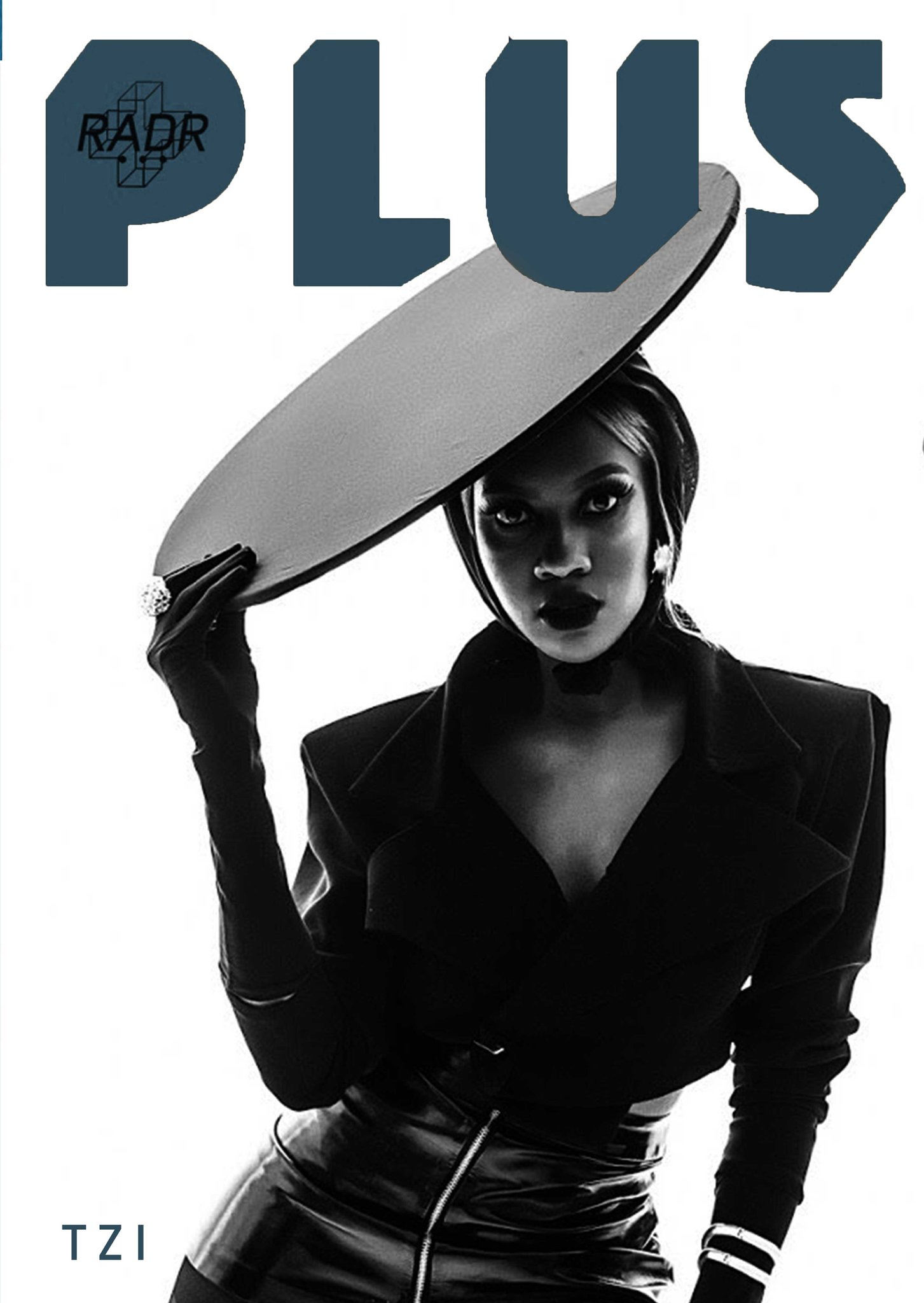
Tzi On Her Unique Experiences and Discovering Herself
RADR spoke with 22-year old Copenhagen-based Nigerian musician Angel Jemegbe about everything from her upbringing and musical influences to how she balances being a lead singer of the rock band South Haven while also doing RnB solo.
In a wide-ranging conversation, Angel highlights her creative process, discovering herself through travel and offers valuable advice for fellow artists based on her unique experiences in the industry.
This conversation has been lightly edited for clarity.
D: So, first of all, your artist name. Which is it? Is it Tolani, Is it Tzi. Is it Mellow?
T: I’m really glad you asked this question because it’s been a roller coaster trying to find my actual name for music. I was called Tolani, which was fine up until there was another Tolani you know, [the Otedola one] so I was like, “Oh, that might not be such a good idea because she’s going a little bit faster than I am right now.” And Mellow was my Instagram name back in the day. But that’s gone. So right now I’m at Tzi which is actually pronounced zee, like the letter Z.
D: How long have you been doing music?
T: I’ve been doing music officially since I was 12. The first time I really did anything about it was when I was in the High School Musical franchise back in Lagos and Abuja. And that was my first time officially performing as a musician.
D: Did you have a musical background before that? Were your parents into music or you discovered it on your own?
T: I discovered it on my own but my mom has this theory. She had this theory that it was because when she was pregnant with me, she attended Fela’s burial in [1997]. So she spent about a week and it was so much music at the burial. And she said right after that, every time music would play, I would kick. And she was like, okay maybe there’s something.
D: Since we’re on that topic, how about your musical influences? Do you have any?
T: Yeah, I do. I have a wide area of musical influence because I like to listen to music from every genre. I listen to mostly rock, but I try not to box myself in and, you know, really expand. So from every genre of music, I have somebody who influences me. And then afrobeats I would say right now it’s Burna Boy, obviously. In pop music, I would right now have to go with Jorja Smith cause she’s so, so good.
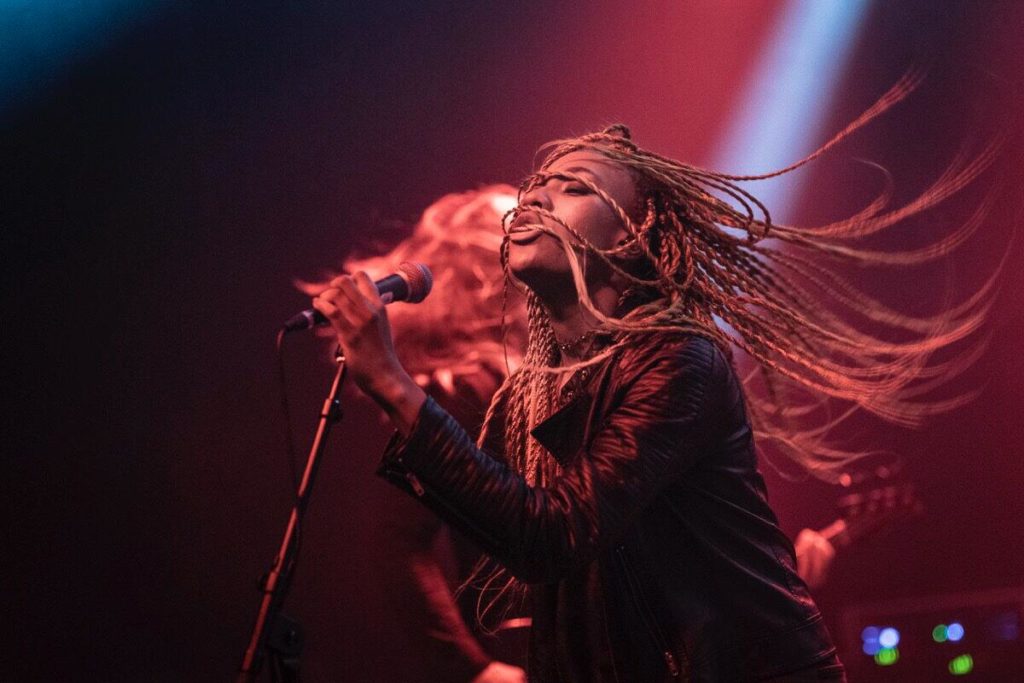
In rock, I will always say Queen. And I love classical; I listen to a lot of Bach. I love his stuff. I think that he’s fantastic. And in indie music I listen to James Bay. So I listen to a lot of music, a lot of influences. But I would have to say my number one influence of all time and all the genres has to be Machine Gun Kelly. I know it’s stupid.
D: Why MGK?
T: I think that he’s just so good, like he’s what we need right now. He’s an artist who can do almost everything. #he can rap, he can sing, he can act. He’s not just MGK anymore. Before he was just MGK. Now he’s gone from being just a person to a band, a brand, and he’s just so great. And I’ve seen him in concert. I’ve listened to his music and you know, he’s not bad looking for my eye. All that kind of comes together really well. Sometimes you don’t know why you really like the people you like honestly. But I just think he’s amazing.
D: So what would you say musically you admire in MGK?
T: He was a really good rapper. I really wasn’t fucking with him much when he was rapping actually. I really got into him when he started singing punk and there’s something about the 2005, 2006 nostalgia pop-punk music that really gets to me. He kind of brought that back when he did this collaboration with YUNGBLUD and that really got me into him. And then he released the Hotel Diablo album and that album was a mix between rap, punk and pop. And it reminded me of a very Linkin Park era and I really fucked with it ‘cause I really, really liked that era. He was able to get me back to a place that I hadn’t been to in so long with his music and his lyrics and I just fell in love with them.
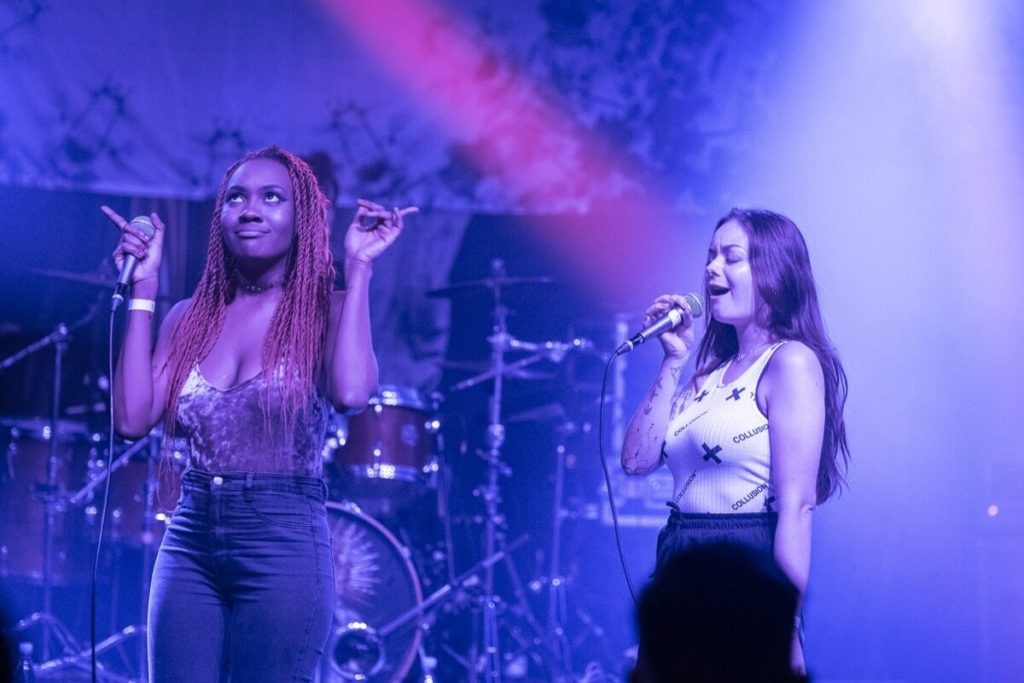
D: I feel like that’s something you would want to do with your music?
T: Yeah. Yeah, definitely. Definitely.
D: Can we talk a bit about how you grew up and how you moved from Nigeria to Denmark?
T: So I grew up in the most unexpected of places ‘cause people always think it’s a lie. I grew up in Abule Egba right? Up in Lagos. Yeah and Abule Egba was very ghetto. Let me tell you.
D: I can tell from the name.
T: It was the ghetto of the ghetto. It was crazy. It was raw. It was tough out there. There were days where you would have to lay flat in your apartment because thieves were shooting from across the street and robbing hoods. It was nitty-gritty but it was really nice because it helped build character for me. And during that time, about the last year when I lived in Lagos, I went to Copenhagen for the first time to see my father because he moved here a couple of years after I was born actually. When I went to see him again, I hadn’t seen him for a long time. And he said, you know, you like Denmark, what do you think about it? You know, it’s fucking, it’s fantastic.
I’m not a big fan of the cold, but it’s great. And I was just excited to get out of Nigeria for the first time—I was 12. And then over time as the years went by, I started going back and forth from Nigeria to Copenhagen a lot and we moved to Abuja and I got like a whole different side of life cause Abuja is just very quiet, compared to Lagos. So I got to kind of figure out who I wanted to be what I wanted to do. And I spent a lot of time going back between Denmark and Luxembourg—where my uncle lives—and Lagos and Abuja. And so I was going around four cities a lot and it really helped, you know, sort of shape me cause I became very independent. I was traveling by myself, I was living by myself at 16, 17. And it was really, really nice to sort of figure out who I am and what I wanted to be. That helped me grow up really fast. So when I was 19, I moved to Denmark. I’ve only lived here officially for three and a half years.
D: So when you were moving around four cities, what were you doing at that point? Were you in college? Were you just doing music?
T: I was still going to high school in Nigeria ‘cause by this time I was still in high school. I haven’t gone to college. I kind of skipped that. I went twice and it was not for me. When I was in Copenhagen, I mostly spent my time(I’m a big cinephile) watching a lot of films, kind of building up on my culture a little bit, my pop culture or whatever you would call it, film culture. And when I was in Luxembourg I was doing a lot of partying actually because my uncle had a lot of friends so they would always ask me to go to places and I was spending a lot of time in goth clubs, which was very weird. So that’s when I realized rock was a huge part of my life ’cause I was slowly becoming very goth and I was spending a lot of time in goth clubs and at one point I worked a little bit for the African consulate in Luxembourg. That was nice. It was okay but I was 17, I didn’t really want to be working. I wanted to be drinking tequila in the morning and listening to a lot of Lana Del Rey. But that was basically what I was doing. I was just experiencing life and trying to understand stuff.
D: I think it’s very important as an artist to have this period of freedom and experimentation and just doing whatever you want. But then you have to contrast it with the traditional Nigerian upbringing where it’s like, read your books, go to school, leave music. How was that different for you? How did you have this freedom and why do you think you had it?
T: My parents are super chill. That’s the only thing I can tell you. My mom is so cool. She’s like my best friend, we talk about everything. And right from a young age, she could tell that music was it for me. My mom, she ran away from home as a kid. So you have to imagine, she’s a rebellious person. So she understood that I would be rebellious and boxing me in would only make me more rebellious. So her choice was to overexpose me. To say, okay, go and see everything and sort of do you and figure out what you want. And that’s why I’m living by myself in a different country and kind of surviving at 22.
D: When I read your email, like, “Hi, my name is Angel, I’m 22 years old and I’m a Nigerian in Copenhagen. I do rock music, heavy metal”–that was how you put it–and then “RnB solo music on the side”, I was like, okay, that is one hell of a combination. How do you make it happen? Do they influence each other? Where do you get the inspiration for that? How are you able to switch between different sounds? Is it easy? Is it hard?
T: It’s easy. It’s very easy for me. It comes from liking so much different stuff and appreciating truly the essence of so many different kinds of music that you’re able to give that back when you decide what you want to actually focus in on. With rock, it’s so easy for me. Because I grew up listening to Linkin Park, Adam Lambert, P!nk, I wouldn’t call them the heavy, heavy, heavy influences, but they were the ones that sort of kicked it up for me. And then eventually I went on to Queen and Motley Crue, Iron Maiden, Led Zeppelin. And over time it just grew from classical to heavy to really, really, really sometimes death metal. But it really comes so easy for me to sing, grow up, to perform rock and to just work with rock. But it’s also one of the most challenging genres of all time for me, at the same time, as easy as it is, because it can be a bitch on your vocals.
D: I was about to as because I listened to Dancing in Nightmares and had a similar thought
T: Yeah. And we have harder songs on the album. Much, much harder songs. The album is going to come later this year. And so when we do a set of these songs that are so challenging, I sing most of the lower parts in our songs so I have to go really, really deep and sometimes almost do a growling sort of a key. And it is hard on your vocals, but when you do RnB, it’s so easy because let’s face it, pop is everywhere. Pop and RnB is everywhere. They’re in our day-to-day lives. We can’t escape that. You listen to it and you go to the club. Sometimes you hear it on the bus, sometimes you play it. It’s part of your everyday life. So when I’m writing pop and RnB, it’s automatic. I don’t even think of it. I can write it. I wrote Acid in 30 minutes. It just comes to me. So that I would say is the easiest for me.
D: Thank you for bringing everything back to Acid. What was the process for that song? What was on your mind, what was your inspiration? Generally, how do you write music? How do you go from an idea to form an actual song? How’s that for you?
T: Well for me, when I’m writing music, the first thing I always do is God, I hope my mother doesn’t read this, I always light up a joint. That is the first process. I always smoke ‘cause that really opens my mind. When I’m sober and I try to write, I feel blockages. I’m nervous and I’m like “Oh my God, I have to write something good.” But when I smoke, I get a little bit more relaxed.
I always go to producers and I’m like, play me a beat. That’s my favorite thing to do. I love to sit with producers and just see what they’ve done or see if they want to sort of come together and make ideas. But with Acid, my producer called me up, my old producer and he was like, I have this beat and I think it’s fantastic. So I go to the studio and obviously we light up a joint. We start talking and I just said, you know what? I want this song to be about a love affair, but a love affair that you can have towards anything. I don’t want it to be one-dimensional. I wanted you to be able to have multiple meanings when you listen to it. It can be, “Oh I love drugs”, “Oh I love women” and it can be, “Oh I love this or oh I love that”. And so Acid is kind of like a metaphor for anything that gives you like a euphoric feeling.
D: I was kind of thinking the same. I was listening to the song trying to put together some questions. And I’m going, “ what is this song actually about?” It’s definitely not about a relationship or a love affair although it sounds like that sometimes, other times it sounds like it could be about anything.
T: Yeah it is definitely. I like to call it stoner music. I like to make stoner music. When I was making Acid, I was thinking “would I like to listen to this?” That’s something that gets to me when I’m making music. I’m like, would I like to listen to this for a long time and still not get sick of this? Is this music I can still play two years from now and be like, that was a good song. You know? And I made Acid three years ago and when I play it now I still think, you know what? That was a good song
D: Are you signed to any label or are you going indie and what are your long-term goals concerning your music?
D: With South Haven we just played Japan. We just did a big show in Tokyo and that was supposed to be big exposure gig. We’re trying to see if we can get signed, but for right now we’ve put all that on the back burner because we actually realize it might be better to go indie on the album and to be independent for a while. So we’re only signed to a talent management company and they book us all our gigs and get us all our shows and they’re a very big part of the band. For me, independently, I’m not signed to any label. I am very, very much independent. Everything I’m doing is by my own volition. And I don’t really want to be signed to a record label per se, anytime soon. More of a management company.
D: I don’t think a lot of artists are aware of management companies. It’s always, get a label, get signed, get money.
T: Yeah. But it’s not always good. I would tell every artist to always do a management company first. Because the management company, what they’ll do is manage. You’ll still be able to make all your decisions and you pay them to help make your decisions better. They’re not going to take any of your money. They’re not going to take your percentages. You’re still going to be able to be the creative that you are. But with labels, they take away all your power, introduce all these legal things and you’re basically stuck in a box for four years while they take all your best music and all the best things you have because you’re still new, you’re excited. You want to do this. So they just take all your best work. And then when you’re done, you’re left with nothing to do.
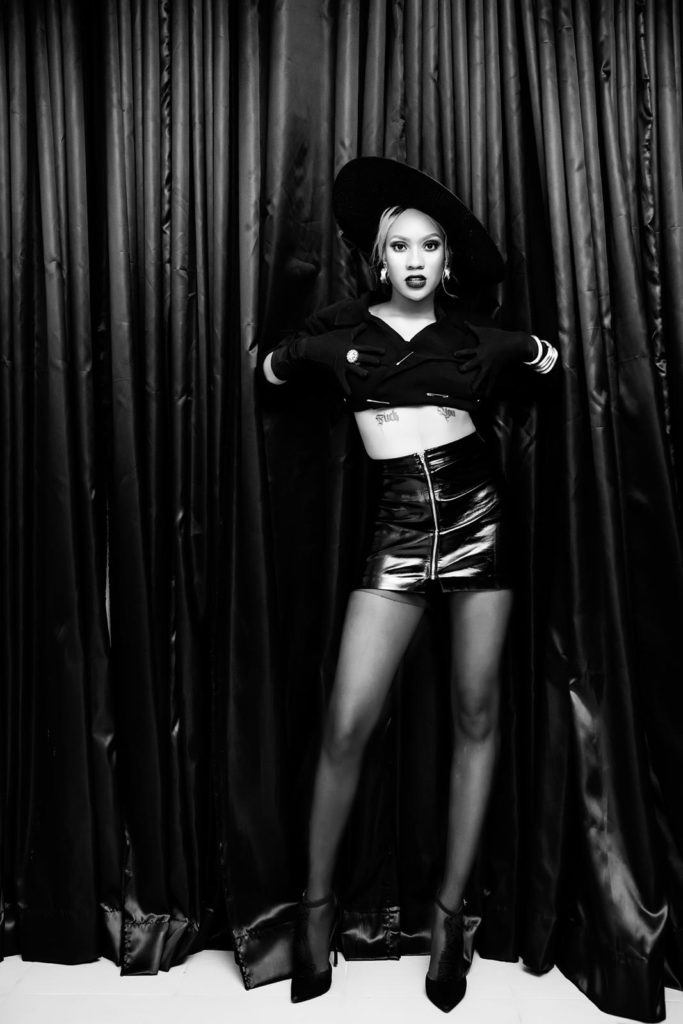
The same thing happened to Ycee, it happened to Taylor Swift. It could happen to anybody. So I always tell young artists never ever sign, as great as it is, as amazing as it sounds, as awesome as it will be. Keep your day job until you can properly fund yourself and then do a management company and eventually when a great deal comes along that you can get something really tangible out of and you can get to keep all the copyright to your music because that’s really important, then you sign that deal, do not sign any deal that says you can’t keep your music because you’re fucked.
D: How do you fund your music? Do you have a day job or are you making money off music?
T: I’m not making money off music. I’m actually in-between jobs. I just quit one job and I’m going to the next one. But I worked a lot in the hospitality business here in Copenhagen. It’s actually a really nice kind of job. I was a waitress for a long time, which is what a lot of musicians do actually. We’re all like part-time waiters. But I quit because it wasn’t for me anymore and I decided to go for a more corporate job so that I can save up and make more music.
D: Have you been worried about making money off your music?
T: I think for me, right now, for me, the money will come later. I’m not doing it for the money. I’m doing it for the music, you know? So if I have to fund it and fund it and fund it until finally something comes out of it, great. And if it doesn’t, I’ll just keep funding it until it does. Sometimes for me it is 0% about the money. It is 100% about the music.
D: How do you see your music going forward? What has changed from Acid up until now
T: My voice has definitely changed. I think puberty hit me late for that one. My voice is definitely a different texture, but I think that comes from performing more shows and spending a lot more time in the studio and doing more rehearsals and just having a full on more intense experience with music. That always changes the texture of your voice, especially if you’re in a younger age between 18 and 23, 24. Another thing is I’m a much more mature person and a much more grown person and I think you can always hear that in lyrics and in the music. And I definitely think that the genre I do now will definitely be a little bit different from Acid, but not quite so far away from it. I’m really right now into making music that makes people dance and I don’t know in what direction I’m going to go with that, but I’m excited to see it.
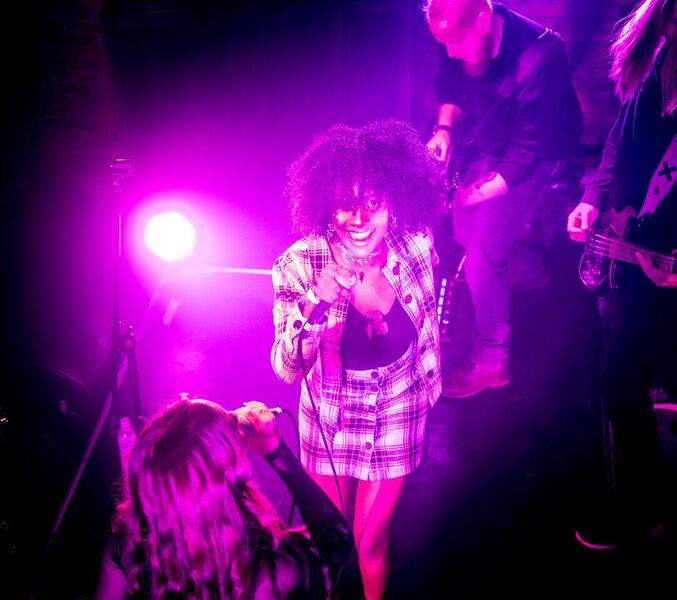
D: What kind of “dance”?
T: I’m still trying to figure it out. I’m really into trumpets right now. I love how they sounded on Burna Boys’ album, I thought that they were fantastic and I love heavy bass’, like deep bass’ and just deep sounds and I want something that when you listen, you close your eyes and you can see a story. So for now that’s just the idea that I have and I hope I can build on that.
D: Have you done anything kind of afrobeats or are you going to? If you are, what are you going to sample in regards to afrobeats and Nigerian influences?
T: Right now I’ll start by saying I really, really enjoy listening to Reekado Banks and Burna boy. I really like the direction they’ve been going with afrobeats and that might be the most inspiring thing that I’ve heard in that genre in a while and Lady Donli and Santi and Odunsi, you know, the whole alté afrobeats move. So if I am going to explore Afrobeat it’s definitely going to be alté. But I want to bring back a little bit of this Fela spice, the way Lady Donli does it, I want to bring that back.
D: How do you take care of yourself as an artist, mentally and physically, is there anything you do to keep yourself in tip-top shape?
T: Well, in this business there’s a lot of things you can do to keep yourself in tip-top shape, especially when like me you’re spending a lot of time traveling with crazy rock stars who want to throw shoes at your head and get drunk all the time. You really, really, really have to reach deep within and not to let the rage flow through you. Before in the past I used to do a lot of meditating, a lot of yoga. Lately I’ve been busy a lot so I haven’t had time to do all that and when I don’t find time to do that, I just kind of have been relaxing and it’s really important that you find time to spend with people you love and you find time to spend with yourself especially, because sometimes you just kind of need to be alone and breathe and try to process it all because it can be so overwhelming sometimes.
Musicians feel so much, you know? You feel all these emotions and it makes good music and sometimes it leaves us depressed. Like it sucks out all this energy from you afterwards. So you really have to find time to do the things you love. Like you have to cherish lovingly, you have to find hobbies and like them. So those times that you get to escape and you get to get away and you get to do the things that you love, like that’s very important for me. So I spend a lot of time smoking, listening to music, reading. I’m a big, big, big reader. Um, I listen to a lot of podcasts. I love to watch films and I’m a very cultural person so I like art. I like literature and I just go in that direction. Usually it’s for sanity.
D: Any recommendations for podcasts, books, movies, anything recently that really connected with you?
D: I love that question. I like when people ask me what books I like. The last great book that I read that I think was fantastic was actually The Thing Around Your Neck by [Chimamanda Ngozi Adichie]. I would also recommend The Road Less Traveled. That was a really, really good book about mental health and stability and balance in life. For podcasts, the last thing that got me was the Great Moments in Weed History.
It’s educational and it has weed in it woooo! If that’s not a great learning podcast, I don’t know what is. But there was this episode about Fela Kuti on it and I think that everybody should go listen to that. It’s on Spotify, Apple music, wherever. And the last great film I saw was The Revenant.
D: Back to South Haven, how did you guys get together? Was the band already formed before you came in, how did it come together?
T: Okay, so before I joined the band, South Haven had already been existing for about two years. They just had not put anything out and they were also not even called South Haven then. They were a girl band and they had all the songs recorded but their lead singer quit. So they needed to find a new lead singer. And I remember I found them on Facebook. So I saw a posting that this band is looking for a lead singer and they said uh, send something to this email and I just thought, you know what, why not?
So I applied and I went for an audition and it went really well and they decided they wanted two singers, not one even ‘cause they thought they liked the dynamics of having two girls on stage instead of one. ‘Cause a lot of bands don’t have that. And so we just kind of went from there. That was in 2018 and in 2019, we put out the first single Dancing in Nightmares and it was a massive hit. We have about 225,000 streams right now on Spotify, which is weird because we’re just a new band. We have only two songs. That was a very intense, very nice feeling. And so we just decided to take it from there. We’ve got the Tokyo thing and now we’re playing a bunch of shows with this band called Siamese and we’re on tour for most of January and February.
D: I feel like it’s going to be easier to do things there. There are chances for discovery and there are places that actually showcase indie artists
T: Yeah, exactly. There’s a lot of places here in Copenhagen where there’s an audience and you can just go sing, you don’t even have to do anything. You just will have to want to sing and you can just say I want to do open mic. And they’re like, yeah, come up, sign up, definitely will want to see it. You know, they’re very, very excited to grow you as an artist and there’s a lot of places that would actually fund you. Like for my band, most of our music videos we get funding from the government because they just want to help you and they just want better things to come from the people who live there, they want to give them opportunities. So it’s really much easier.
D: Well it seems like Nigerian artists should consider moving.
T: Yeah, they should. Denmark is really, really great and the Nigerian scene is growing. The Nigerian music scene is growing here like huge. There’s a friend that just started this thing called Alté Natives which is basically like an alté movement here in Copenhagen.
D: As we wrap up, I would like to ask if you have any advice for artists trying to find themselves musically and people who are exploring music as an option. Any advice based on your experiences?
T: I would say take your time. Don’t give up. Don’t listen to what anybody says. Follow your heart and be a 100%, that’s it. Know what you want, be passionate about it. be ready to work hard for it and do not let anybody tell you shit because people will always try to bring you down. People will always tell you you’re the worst version of yourself, but you have to find the inner voice within you and listen to that voice and being 100% yourself, even if yourself is the most flamboyant person in the world. No matter how crazy you think, you are. There is always someone crazier. So just be yourself and work hard and what is yours will always rightfully come to you.
D: What has been your best experience and your most challenging experience so far with music?
T: My best experience so far with music, Oh, I would have to say funny enough has been when we played a show in December. It was at this place in Copenhagen called Randers. And it was funny because it was the smallest show we ever played. It was this really small, shitty venue, not shitty, It was an okay venue. It wasn’t like the greatest. It was really small and it was just 20 people. But man, the energy in that room, ‘cause I remember I was completely a little bit, not sober. My counterparts were also not sober but when we got on stage, we just played. And I remember for the first time everything clicked in my head, you know, and it was just December last year. It was just this, this is exactly what I’m supposed to be doing feeling. Because we got 20 people in the middle of nowhere dancing, you know, when you can do that, you have this, I can do anything kind of feeling.
My most challenging experience I’d have to say is the creation process, you know, and the beginning and the end of the music process. That for me has been the most challenging. Creating and then giving it to people. ‘Cause when you make music, you put so much into it and when you release it, you never know how it’s going to be received. That for me is very challenging for my mental health ‘cause it’s really scary and it’s really nerve-wracking to see how people are going to take what you’ve spent so much time on. So that for me has been the most challenging. But other than that, it’s been a joyful road.
Thanks for chatting with us Tzi!